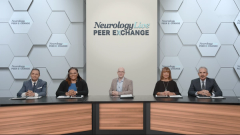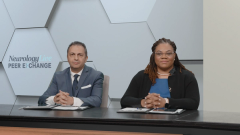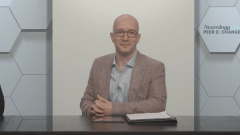
Updates on Vaccine Efficacy in Multiple Sclerosis
A panel of experts discuss COVID-19 vaccine efficacy for patients undergoing treatment for multiple sclerosis.
Episodes in this series

Stephen Krieger, MD: Well, let’s turn to our final topic. And I think it’s very nice that we’ve arrived at a point where we can spend 90 minutes together talking about lots of issues in MS [multiple sclerosis] treatments and MS management and save the intersection of MS and COVID-19 for the last 5 or so minutes. For a long time, we spent a lot of our time talking to patients just about that. So it’s nice to be able to get back to our true commitments to keeping people with MS safe and free of disease activity and minimizing progression and hopefully have COVID-19-related concerns be minimal. But we still have some.
Let’s talk a little bit about the current iterations of COVID-19 vaccines and our MS treatments because that’s going to be a perennial issue. Even if and when COVID-19 itself is more of a background issue, the idea of keeping our patients vaccinated effectively for this pathogen and other pathogens yet to come in the setting of immunotherapy is going to remain important. So start by thinking about what the data have looked like over the first couple of years of the pandemic with respect to vaccine efficacy and treatment. What has been your key takeaway?
Heidi Crayton, MD: I think entering the pandemic, we had no data. We had no information on how our patients were going to respond to vaccines and if there was going to be a difference in terms of response according to DMT [disease-modifying therapy]. And I think many of us started gathering that information because there was none that existed. So I started data-gathering within my own patient population, and I knew the B-cell depletion therapy made sense that they would not really mount a response. I was surprised by the extent to which folks on the initial S1P [sphingosine-1-phosphate] receptor-modulating product really also mounted no response. I think that we’ve all seen that that has been a little bit better. The response has been a little bit better with the newer-generation S1P receptor modulators, which has, again, been reassuring.
But it’s really taught us a lot about what we really are doing to our patients immunologically, and that we also have the responsibility to help protect them when they feel extra anxious and fearful because their medication has prevented their response and, on the flip side, provide protection for them. We’ve given [tixagevimab/cilgavimab] to a lot of our patients, so I think that’s part of our responsibility as well. But it’s really taught us all a lot about how to be an immunologist, even when we never thought that we would have to do that.
Stephen Krieger, MD: True. And, Dr Hughes, you were also earlier talking about what is and is not a class effect with the modern S1P modulators. What have you seen that has moved you with respect to vaccine efficacy, at least the way we measure it with antibodies in this era?
Bruce Hughes, MD: …As Dr Mitzi Williams alluded to earlier, you learn and evolve. And it was extremely dispiriting when you saw the response, or lack thereof, with fingolimod and the mRNA [messenger RNA] vaccines. And this would fit in, I think, with Dr Williams’ paradigm of potentially switching within the class because these data that were presented at CMSC [Consortium of Multiple Sclerosis Centers] annual meeting were very reassuring. And we have certain patients that are just terrified of COVID-19, rightfully so, and wondering whether their MS treatment has made these vaccines useless in them. And now being able to present this to patients is going to be just supremely reassuring.
Stephen Krieger, MD: Yes, I think you’re right. The long-term data on ponesimod show that the majority of them did mount an antibody response after mRNA vaccination. I think we’d seen also data somewhat similar from ozanimod in mounting an antibody response that we hadn’t seen before. Any other advice that you’re giving your patients about vaccine efficacy and the use of vaccines in the setting of MS immunotherapy?
Mitzi Williams, MD: Yes. I always try to counsel my patients to the best of my ability. And fortunately, we have conferences like ECTRIMS [European Committee for Treatment and Research in Multiple Sclerosis] that give us these updates and help us to distill this information to take back to our patients. I encourage all my patients to be vaccinated. I do often counsel them about the limitations, depending on the therapy. But I think that overall, we do the best that we can. Maybe there’s not as good efficacy with vaccination, but if the patient is very stable, we just have to balance that disease-modifying therapy and their disease stability with those other factors. And as Dr Heidi Crayton said, Evusheld and other antibodies can sometimes help us to feel more confident that we’re boosting their immunity to an extent.
Stephen Krieger, MD: Dr Bandari, in California, what has been the approach on the other coast in the modern era?
Daniel Bandari, MD, MS: It has been more in favor, obviously, as you know. However, there is still a selection of the cells of the patients who are still hesitant and resistant or nonbelievers in that part, which are not that high of a percentage. I have to say, over the past 2 and a half years, we have come a long way, all of us. From thinking about the fact that in March of 2020 we were looking at the impending doomsday for humanity, in a sense that we really thought this would be Armageddon, compared to now, where we’re able to live relatively normal lives, it has come a long way. And especially so when you bring it to our patients with MS, who always were worried about the fact that they are all thinking they’re all being immunosuppressed. And that’s one of the key things they all think; no matter who they are, they think, “I am immunosuppressed.” And you explain to them, “No, you are not immunosuppressed. But at the same time, the vaccination would help you to stay healthy.”
I think one of the bigger elements, as you all mentioned, was the fact that disheartening data came out at the beginning of 2021 that showed this fingolimod and the B-cell inhibitors were the highest rate of the patients who were hospitalized and ICU [intensive care unit]-hospitalized patients. I think that was something that brought this element of question. And my hat’s off to the fact that almost every pharmaceutical company has been able to provide data, including for ponesimod and agents of most other companies. It gives us reassurance of the lack of attenuation of the vaccination. And this is going to, I think, continue.
In southern California, I have advised my patients to completely get vaccinated and boosted to the maximum level that they can. Am I able to accomplish that for 100% of my patients? Absolutely not. But concerning the majority of them, I have [strongly recommended vaccines] to the point that they have been getting vaccinated. And I’m hoping that because COVID-19 is something that we’re going to live with for the rest of our lives, most likely, getting accustomed to it and getting our patients to get accustomed to having a booster shot annually is not a big price to pay for them to be able to continue on their medication and control their disease.
Stephen Krieger, MD: I think that’s quite right. Certainly, in New York, we’ve tried to do similar data capturing as Dr Crayton mentioned, to get a sense as to whether the vaccines were effective and the boosters were effective so we could counsel people moving forward. Some work by one of my colleagues, Dr Sammita Satyanarayan, a neurologist at Mount Sinai in New York, New York, looked at the effectiveness of boosters in terms of antibody production. That was prescient. I don’t think we even realized at that point that boosters were going to likely become an annual tradition like a flu shot. So I think data are going to be important to track as well.
But I would say even for the folks who are on B-cell depletion therapy or S1P modulators, even the older generation of S1P modulators, the vast majority of COVID-19 infections have been mild to moderate. Most of these people have not ended up hospitalized. I think that’s certainly true at this point in time. That’s also a note of reassurance that I’m trying to give to people with MS, who, I think, felt uniquely vulnerable. And our jobs as MS specialists are to try to help our patients with MS be as nonvulnerable as possible, be out there living their lives. I think this is another aspect of that.
Daniel Bandari, MD, MS: Well, they’re looking to us to be able to give them the most updated information that they need to get, such as, Do I need to get this last vaccine? And they probably know the answer is yes, but at the same time, they want to make sure it’s coming from you.
Transcript edited for clarity
Newsletter
Keep your finger on the pulse of neurology—subscribe to NeurologyLive for expert interviews, new data, and breakthrough treatment updates.














